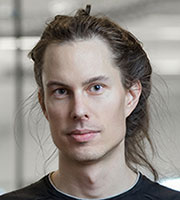- Our Story
- Publications & Resources
- Publications & Resources
- Publications
- IEEE Signal Processing Magazine
- IEEE Journal of Selected Topics in Signal Processing
- IEEE Signal Processing Letters
- IEEE Transactions on Computational Imaging
- IEEE Transactions on Image Processing
- IEEE Transactions on Information Forensics and Security
- IEEE Transactions on Multimedia
- IEEE Transactions on Signal and Information Processing over Networks
- IEEE Transactions on Signal Processing
- IEEE TCI
- IEEE TSIPN
- Data & Challenges
- Submit Manuscript
- Guidelines
- Information for Authors
- Special Issue Deadlines
- Overview Articles
- Top Accessed Articles
- SPS Newsletter
- SigPort
- SPS Resource Center
- Publications FAQ
- Blog
- News
- Dataset Papers
- Conferences & Events
- Community & Involvement
- Professional Development
- For Volunteers
- Information for Authors-OJSP
-
Home
Conferences Events IEEE Signal Processing Magazine IEEE SPL Article IEEE TIFS Article IEEE TMM Article IEEE TSP Article Jobs in Signal Processing Lectures Machine Learning Seasonal Schools Signal Processing News SPM Article SPS Distinguished Lectures SPS Newsletter Article SPS Webinar SPS Webinars SPS Webinar Series Webinar webinars
-
Our Story
What is Signal Processing?

The technology we use, and even rely on, in our everyday lives –computers, radios, video, cell phones – is enabled by signal processing. Learn More » -
Publications & Resources
-
SPS Resources
- Signal Processing Magazine The premier publication of the society.
- SPS Newsletter Monthly updates in Signal Processing
- SPS Resource Center Online library of tutorials, lectures, and presentations.
- SigPort Online repository for reports, papers, and more.
- SPS Feed The latest news, events, and more from the world of Signal Processing.
-
SPS Resources
-
Conferences & Events
-
Community & Involvement
-
Membership
- Join SPS The IEEE Signal Processing Magazine, Conference, Discounts, Awards, Collaborations, and more!
- Chapter Locator Find your local chapter and connect with fellow industry professionals, academics and students
- Women in Signal Processing Networking and engagement opportunities for women across signal processing disciplines
- Students Scholarships, conference discounts, travel grants, SP Cup, VIP Cup, 5-MICC
- Young Professionals Career development opportunities, networking
- Get Involved
-
Technical Committees
- Applied Signal Processing Systems
- Audio and Acoustic Signal Processing
- Bio Imaging and Signal Processing
- Computational Imaging
- Image Video and Multidimensional Signal Processing
- Information Forensics and Security
- Machine Learning for Signal Processing
- Multimedia Signal Processing
- Sensor Array and Multichannel
- Signal Processing for Communication and Networking
- Signal Processing Theory and Methods
- Speech and Language Processing
- Technical Working Groups
- More TC Resources
-
Membership
-
Professional Development
-
Professional Development
- Signal Processing Mentorship Academy (SigMA) Program
- Micro Mentoring Experience Program (MiME)
- Distinguished Lecturer Program
- Distinguished Lecturers
- Distinguished Lecturer Nominations
- Past Lecturers
- Distinguished Industry Speaker Program
- Distinguished Industry Speakers
- Distinguished Industry Speaker Nominations
- Industry Resources
- IEEE Training Materials
- Jobs in Signal Processing: IEEE Job Site
-
Career Resources
- SPS Education Program Educational content in signal processing and related fields.
- Distinguished Lecturer Program Chapters have access to educators and authors in the fields of Signal Processing
- Job Opportunities Signal Processing and Technical Committee specific job opportunities
- Job Submission Form Employers may submit opportunities in the area of Signal Processing.
-
Professional Development
-
For Volunteers
-
For Board & Committee Members
- Board Agenda/Minutes* Agendas, minutes and supporting documentation for Board and Committee Members
- SPS Directory* Directory of volunteers, society and division directory for Board and Committee Members.
- Membership Development Reports* Insight into the Society’s month-over-month and year-over-year growths and declines for Board and Committee Members
-
For Board & Committee Members
Popular Pages
Today's:
- Information for Authors
- (ASRU 2025) 2025 IEEE Automatic Speech Recognition and Understanding Workshop
- IEEE Transactions on Information Forensics and Security
- IEEE Transactions on Multimedia
- Information for Authors-SPL
- IEEE Signal Processing Letters
- Call for Papers for ICASSP 2026 Now Open!
- Membership
- IEEE Transactions on Image Processing
- Submit a Manuscript
- (ICME 2026) 2026 IEEE International Conference on Multimedia and Expo
- IEEE Journal of Selected Topics in Signal Processing
- IEEE Transactions on Signal Processing
- Governance Documents
- (AVSS 2025) 2025 IEEE International Conference on Advanced Video and Signal-Based Surveillance
All time:
- Information for Authors
- Submit a Manuscript
- IEEE Transactions on Image Processing
- IEEE Transactions on Information Forensics and Security
- IEEE Transactions on Multimedia
- IEEE Transactions on Audio, Speech and Language Processing
- IEEE Signal Processing Letters
- IEEE Transactions on Signal Processing
- Conferences & Events
- IEEE Journal of Selected Topics in Signal Processing
- Information for Authors-SPL
- Conference Call for Papers
- Signal Processing 101
- IEEE Signal Processing Magazine
- Guidelines
Last viewed:
- (ISBI 2026) 2026 IEEE 23rd International Symposium on Biomedical Imaging
- Hybrid Beamforming for 5G Millimeter-Wave Systems
- Signal Processing 101
- TC Best Practices
- Chapter Resources
- Introducing the IEEE Transactions on Molecular, Biological and Multiscale Communications
- Reviewer Instructions for OJSP Reproducibility Reviews
- SPS IFS TC Webinar: 8 June 2022, by Pavel Korshunov
- Author Instructions For OJSP Reproducibility Review
- About Open Journal of Signal Processing
- Call for Proposals: IEEE MLSP 2026
- Distinguished Industry Speaker: Jinyu Li (Microsoft, Redmond, WA, USA)
- For Volunteers
- Distinguished Industry Speaker: Farhan Baqai (Apple, USA)
- (AVSS 2025) 2025 IEEE International Conference on Advanced Video and Signal-Based Surveillance
Industry Leaders in Signal Processing and Machine Learning: Tomas Mikolov
You are here
Newsletter Menu
Newsletter Categories
Top Reasons to Join SPS Today!
1. IEEE Signal Processing Magazine
2. Signal Processing Digital Library*
3. Inside Signal Processing Newsletter
4. SPS Resource Center
5. Career advancement & recognition
6. Discounts on conferences and publications
7. Professional networking
8. Communities for students, young professionals, and women
9. Volunteer opportunities
10. Coming soon! PDH/CEU credits
Click here to learn more.
News and Resources for Members of the IEEE Signal Processing Society
Industry Leaders in Signal Processing and Machine Learning: Tomas Mikolov
 Tomas Mikolov is the creator of Word2Vec which was developed in 2013 by a group of researchers led by him at Google Brain and has been widely used since then (28,000 citations). He is a pioneer for leveraging Recurrent Neural Networks (RNNs) for natural language which replaced n-gram language models that were state of the art for decades. He later moved to Facebook AI where he contributed to fastText project that currently includes word representations for 157 languages. He currently leads a research group at CIIRC in Prague focusing on developing mathematical models which can spontaneously evolve and increase in complexity.
Tomas Mikolov is the creator of Word2Vec which was developed in 2013 by a group of researchers led by him at Google Brain and has been widely used since then (28,000 citations). He is a pioneer for leveraging Recurrent Neural Networks (RNNs) for natural language which replaced n-gram language models that were state of the art for decades. He later moved to Facebook AI where he contributed to fastText project that currently includes word representations for 157 languages. He currently leads a research group at CIIRC in Prague focusing on developing mathematical models which can spontaneously evolve and increase in complexity.
We approached Tomas Mikolov with a few questions:
1. In your own words, please tell us about your background.
I did obtain my PhD from Brno University of Technology in 2012 for my work on recurrent neural networks and language models. I was always interested in the connection between language and intelligence, and I was very excited when my work did finally lead to a major improvement over the n-gram language models which were the state of the art for many decades. After finishing my PhD, I joined Google Brain team where I developed a popular algorithm for learning word representations (word2vec) and some of the earliest models for neural machine translation. In 2014, I moved to Facebook AI to focus more on fundamental AI research. More specifically, I was interested in understanding how learning from communication can be accomplished in cases where there are no well-defined rewards or supervision. However I also continued working on applied natural language processing (the fastText project). In 2020, I joined a research institute CIIRC in Prague to start a new research group focusing on developing mathematical models which can spontaneously evolve and increase in complexity, as I see the evolutionary principles as one possible path towards general AI.
2. What challenges you had to face to get where you are today?
I think the most frequent challenge I did face during my career is the disbelief of others. When I wanted to work on recurrent neural networks, I was told that it has been proven these cannot be trained and I should just give up. When I wanted to apply neural networks to language, I received a terrible review of my work from a local NLP professor who wrote that all my ideas are rubbish and neural networks will never do anything useful for language. When I reported 50% perplexity reduction on difficult benchmarks, I was told by many scientists that I must have a bug in my setup because the improvement is too big. When I did show that one can form simple analogies using word vectors - the famous 'King - man + woman = Queen' example - there was also lots of disbelief at first. And when it finally became clear my results are not fake, I was told that I've been just lucky. I think the research community would be much more pleasant if there was a bit less of narcissism and a bit more of curiosity.
3. What was the most important factor in your success?
I believe the most important is to not give up, and while it will sound very cheesy, to believe in yourself, to have your own goals and work on what you find the most exciting.
4. How does your work affect society?
My ideas did propagate to the NLP community and to many products which are used by billions of people. Today, Google Translate is built around neural networks, which was my dream goal just some ten years ago - and something I started working on immediately after joining Google in 2012. To sum it up, my work did improve efficiency in how computers deal with natural language.
5. If there is one take home message you want the readers of this interview have what would it be?
My message is that doing research is an exciting career, and the moments when you do something new for the first time ever are amazing. When I generated text from neural language models as a student in 2007, I knew I was observing something that nobody did see before me. The text was much more fluent than when generated from n-gram models, and I knew this is the future. Today, we cannot go to discover a new continent; however, one can have an amazing adventure when doing basic research.
6. Failures are an inevitable part of everyone’s career journey, what is the most important lesson you learned during your career when dealing with failures?
That even when you fail, you may obtain something useful - just fail differently than the others. In fact, for most of my career I had very ambitious goals - like, to develop real AI - and when I failed to fulfill these goals, I sometimes ended up having something useful. Like the recurrent neural language models, or word2vec - I did not really aim for these right from the start, these models ended up as simplifications of more ambitious projects (which failed).
7. Although novelty and innovation is the most important factor for technology advancement, when a researcher, scientist or engineer has a new idea there are a lot of push backs until they prove the new idea actually works. What is your advice on how to handle them? Especially for the readers who are in early stages of their career.
That is quite a tough topic. On one hand, we live in the publish-or-perish world, which in my opinion discourages risky projects. On the other hand - we get to live only once, and if you play safe for all your career, you may end up having quite a boring one. So my advice would be: do what excites you the most, and don't worry so much about recognition from others.
8. Anything else that you would like to add?
Thanks for inviting me for the interview.
To learn more about Tomas Mikolov and for more information, visit his webpage.
Open Calls
Society News
SPS Social Media
- IEEE SPS Facebook Page https://www.facebook.com/ieeeSPS
- IEEE SPS X Page https://x.com/IEEEsps
- IEEE SPS Instagram Page https://www.instagram.com/ieeesps/?hl=en
- IEEE SPS LinkedIn Page https://www.linkedin.com/company/ieeesps/
- IEEE SPS YouTube Channel https://www.youtube.com/ieeeSPS
Home | Sitemap | Contact | Accessibility | Nondiscrimination Policy | IEEE Ethics Reporting | IEEE Privacy Policy | Terms | Feedback
© Copyright 2025 IEEE - All rights reserved. Use of this website signifies your agreement to the IEEE Terms and Conditions.
A public charity, IEEE is the world's largest technical professional organization dedicated to advancing technology for the benefit of humanity.









